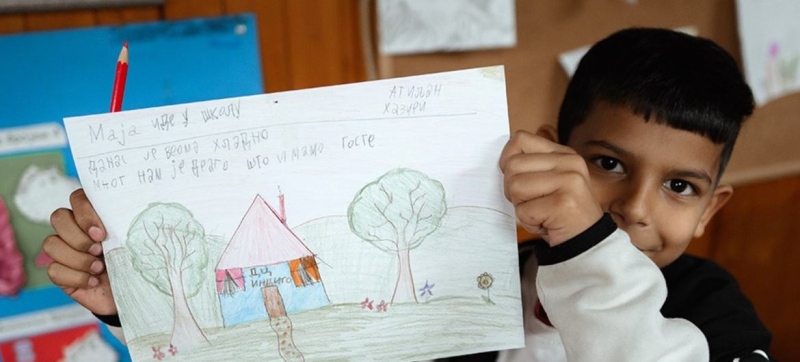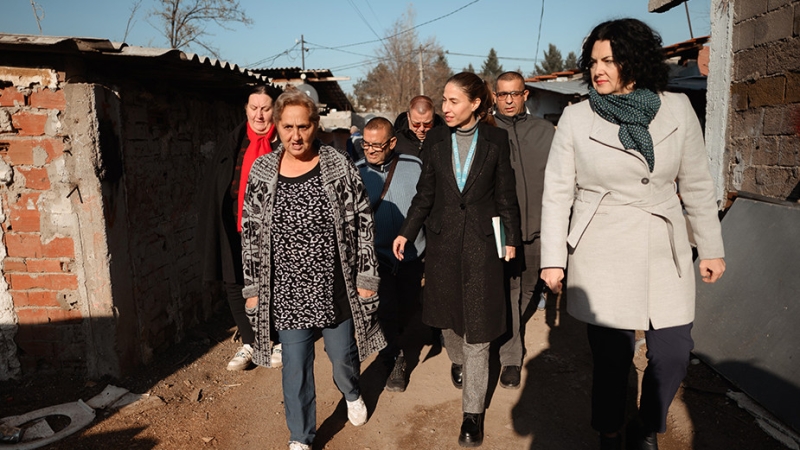
The Roma community in Crvena Zvezda has defended its settlement for decades. The Roma community from the Serbian Red Star defended their village Human rights
“It feels like I’m living in the Stone Age. It’s hard to believe that I have to endure something like this these days,” said Mevla Čupi, a 60-year-old Roma woman who endured freezing winters without electricity while fighting eviction from her home near the southern Serbian city of Niš.
Čupi is one of 550 residents of the gypsy settlement of Crvena Zvezda whose life has been made unbearable by long power cuts intended to force residents to move.
“Since 2011, the entire village was connected to a single electric meter, through which the general bill was received. People had no idea of the volume of individual electricity consumption, so debts accumulated, says Aleksandra Petrovic, OHCHR Serbia officer. “But the main problem was an unresolved property and legal dispute. Cutting off the electricity became one of the methods of pressure to force them to leave. in the 1960s, when 37 apartments were allocated to families who had lost their homes during devastating floods around Niš. Over time, the settlement grew to 105 houses, and the land ownership was divided between the city of Nis and a private company.
The problem arose in 2007, when the company, having decided to develop its share of the land, demanded that the city evict residents whose homes were obstructing commercial development. Thus began a long confrontation between the interests of powerful businesses and local residents who were trying to be evicted.
Massive power outages began in 2011, 2014, 2016 and 2018 as part of a commercial company targeting local residents. In some cases, outages lasted more than six months, extending into the harsh winter months.
Living conditions worsened, and residents flocked to the local social center in search of heat, water, and sanitation.
“Schoolchildren suffered the most – they could neither swim nor do their homework and spent part of the day in the dark, in constant fear of fire, since they used candles as light sources,” says Tamara Simonovich, director of the Group for Children and Youth of the Indigo Social Center. “During the shutdowns, many residents, especially those with small children, came to us in search of basic hygiene, since we have a bathroom with hot water. The center staff provided the residents of Crvena Zvezda with the necessary services and explained their rights.”
During the third power cut in 2016, residents, unable to continue living in such difficult conditions, contacted the Office of the High Commissioner for Human Rights, and this served as the basis for the visit of Aleksandra Petrovic.
I went into every house and saw frightened people sitting there in the dark
“I went into every house and saw frightened people sitting there in the dark. “I’ve seen children after surgery, pregnant women, people with disabilities, children with asthma who couldn’t prime their pumps,” she says. “On top of everything else, these houses were heated with wood, and this only aggravated the already dangerous situation for health. Constant smoke in houses and the danger of fire from the need to carry lighted candles everywhere. The electrical problem was just the tip of the iceberg. The main thing now was to resolve the housing issue.”
This visit was intended to begin a process of empowering residents and allowing them, for the first time, to participate in decisions that affected their lives.

Aleksandra Petrović (pictured in the center) from the OHCHR office in Serbia and Dragana Sotirovski (pictured far right), the mayor of the city of Niš, visited the settlement and met with residents.
Empowering Local People
In the six months following Alexandra Petrovic’s visit, staff from the Office of the UN High Commissioner for Human Rights organized a conference in which Representatives of the government and academia attended, and more than a hundred others, including residents of the Roma settlement, for whom the event gave them the opportunity to declare their intention to remain in their current place.
Until this moment, the approach of the city authorities was to move residents to another place by finding suitable housing for them. The approach changed after Dragana Sotirovski was elected mayor.
“Meeting with residents allowed me to see their deep connection with their homes,” says Aleksandra Petrovic. – They don’t want to move anywhere. Perhaps, as a woman and as a mother, I naturally empathize with these women on some meaningful level. Therefore, we began to look for solutions to the problem that would allow people to improve their living conditions while remaining in their homes.”
Finding a sustainable solution
It took years to find a solution, but finally, in 2023, the city of Niš designated Crvena Zvezda as a site for the construction of social housing, planning to move local residents into new apartments, as well as facilitate the relocation of non-member families to the settlement. to the Roma people, which would promote inclusion and diversity.
Construction plans have now been prepared and the city of Niš has started raising funds to begin work. In this fight, Mevla Chupi is a clear leader.
“We Roma people also have rights,” she says. – The UN Human Rights Office showed us how to fight for our rights. Now no one can kick us out. “Soon we will move to better houses, leaving our old life behind, but we will never forget the struggle that led us to this result.”
